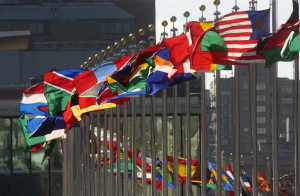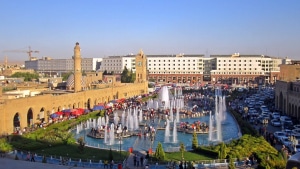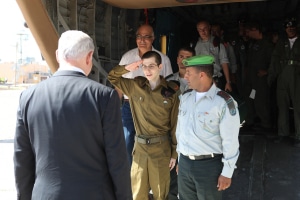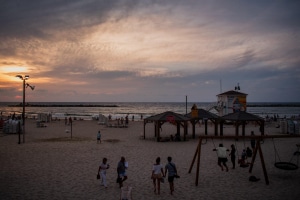Thirty-Four Countries Boycott Controversial Conference on Racism

Flags of member nations flying at United Nations Headquarters (Source: United Nations Photo/Flickr)
This past week at the United Nations General Assembly, thirty-four countries boycotted a session commemorating the twentieth anniversary of the World Conference Against Racism, which was held in Durban, South Africa in 2001. Israeli Foreign Minister Yair Lapid thanked those who led and participated in the boycott.
As the commemoration began, his office released a statement saying, “The original Durban Conference, a UN-hosted event, became the worst international manifestation of antisemitism since WWII.. . . Inflammatory speeches, discriminatory texts and a pro-Hitler march that took place outside the halls were only part of the ugliness displayed in 2001. The ‘World Conference on Racism’ actually ended up encouraging it, including through the parallel NGO forum, which displayed caricatures of Jews with hooked noses and fangs dripping with blood, clutching money. Twenty years later, some of the same organizations have waged a BDS [boycott, divestment, and sanctions against Israel] campaign against the only democracy in the Middle East, but they have FAILED.”
Please pray against antisemitic ideas and images that are so hurtful and dangerous to Jewish people worldwide.
Iraqi Leaders Urge Their Country to Join Abraham Accords

Erbil, the capital of Iraqi Kurdistan (Source: Ask Gudmundsen/Wikimedia Commons)
In a recent conference in Erbil, the capital of Iraqi Kurdistan, more than 300 Iraqi leaders called for their country to normalize relations with Israel and join the Abraham Accords. Prominent Shi’ite and Sunni leaders called for the establishment of diplomatic ties with Israel. In response, the Iraqi government issued a statement criticizing the conference and saying it did not represent the opinions of the people of Iraq.
An Iraqi court also announced that it plans to arrest all 300-plus people who attended once they know their identities. During Israel’s 1948 War of Independence, Iraq had sent the largest military force Israel faced, becoming one of Israel’s leading adversaries in the late twentieth century. Peace between Iraq and Israel, therefore, would be a significant step in securing regional stability. Israel’s Prime Minister Naftali Bennett supported the conference and said, “This is a call that comes from below and not from above, from the people and not from the government. The state of Israel is extending its hand to you in peace.”
Please pray for the safety and well-being of those in Iraq who took a step toward establishing peace with Israel.
Read more about the Iraqi leaders calling for peace with Israel…
Read more about the Iraqi court wanting to arrest three speakers…
Ten Years Later, Gilad Shalit Talks About His Captivity

Gilad Shalit Salutes Israel Prime Minister Benjamin Netanyahu (Source: Israel Defense Forces/Flickr)
Ten years ago, Israeli soldier Gilad Shalit was released from captivity. Hamas, a terrorist group based in Gaza, captured him when they attacked his tank in 2006. They held him prisoner in the Gaza Strip for five years. While in captivity, Shalit was able to listen to Israeli radio and heard updates on the negotiations for his release, which were difficult to hear because they so often ended in failure.
While he had a low standard of living, he explains that Hamas wanted him alive and kept him in good physical condition. Israel agreed to exchange 1,027 Palestinian prisoners for the return of Shalit. Many of these released Palestinians have been imprisoned again for their ongoing terrorist activities. During these past ten years, Shalit has received a lot of therapy, and he is now happily married and employed.
Please pray for Shalit’s continued healing and that he will one day come to believe in Jesus the Messiah!
After the Holidays

A relaxing evening in Tel Aviv (Source: Levi Meir Clancy/Unsplash)
“After the holidays” is a common expression in Israel during the fall festivals. Rosh Hashanah, Yom Kippur, and Sukkot have covered most of September. Thus, there are many days off from work and school, and people postpone most projects and paperwork, making it difficult to get anything done until after the holidays. In a way, delays and lateness are all excusable during this season! Now that the last holiday, Sukkot (the Feast of Tabernacles) is ending, Israel will kick back into gear, and people will fall back into their routines.
Please pray for our workers to enter this new season with energy and gusto to share the message of the Messiah authentically and passionately!
Please pray that those who hear this message of hope and salvation will receive it, especially after having completed the high holiday season of repentance and redemption.




